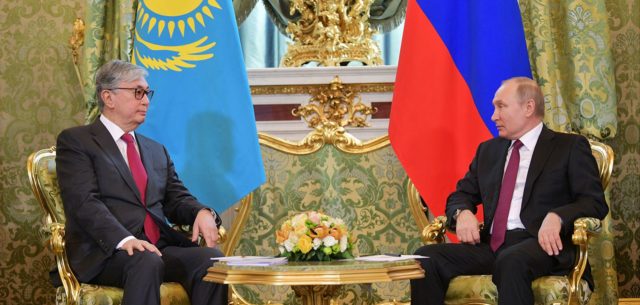
Moscow Outraged That Kazakhstan Becoming ‘a Second Ukraine’
Publication: Eurasia Daily Monitor Volume: 19 Issue: 47
By:

Moscow-based commentators who remain convinced that Russia saved the current government in Kazakhstan by intervening there in January (see EDM, January 19, 21) are outraged that the Central Asian country is not supporting Russia in the Ukrainian conflict but rather publicly taking positions that challenge all of the Kremlin’s claims. Some, like Regnum journalist Bogdan Bezpalko, are beginning to use increasingly bellicose language, such as calling the Kazakhs “little Nazis” and arguing that “Kazakhstan is on its way to becoming a second Ukraine.” Unless this large steppe republic that Russia has long counted on as its closest partner in Central Asia changes course, such writers argue, Kazakhstan will suffer mightily for its failure to support Moscow now (Regnum, April 1). Senior Russian officials have not yet used equally incendiary language, and there is little prospect that Russia, its forces already overextended in Ukraine, will move militarily against Kazakhstan anytime soon. But it seems certain that the Kremlin is equally outraged by Kazakhstan’s stance and, when it can, will take measures to try to force Nur-Sultan to change its position (Politnavigator.net, March 4).
Russian writers have a long list of complaints about how Kazakhstan is responding to the Ukrainian crisis. They are upset that Kazakhstan has permitted pro-Ukrainian demonstrations while banning pro-Russian ones, angry that the Kazakhstani authorities have allowed their citizens to organize humanitarian assistance to Ukraine but not to (Russian-occupied) Donbas, and furious that instead of eliminating “Russophobes” from the government after January, the national authorities have allegedly brought more of them onboard and even allowed groups that Moscow views as anti-Russian to form new political parties (Regnum, April 1). But in the “patriotic” Russians’ minds, those actions pale in comparison to the remarks that Timur Suleymenov, the first deputy head of the Presidential Administration in Kazakhstan, made in a recent interview, during a visit to European Union officials in Brussels (EurActiv, March 29; Moskovsky Komsomolets, April 1).
Speaking with EurActiv, Suleymenov rejected all of Moscow’s positions on Ukraine. He said that “Kazakhstan will not be a tool to circumvent sanctions on Russia [passed] by the [United States] and the EU,” that Kazakhstan will label what Russia is doing in Ukraine a war regardless of what Moscow says, that Kazakhstan has not and will not recognize Crimea as part of Russia, and that Kazakhstan is working hard to diversity its export routes so as to bypass Russian territory. The senior Kazakhstani official, who has the ear of President Kassym-Jomart Tokayev, added that Kazakhstan does not want to be put “in the same basket” with Russia and that both its status as an independent country and its membership in the United Nations are more important as far as these issues are concerned than its membership in the Moscow-led Eurasian Economic Union and the Collective Security Treaty Organization (EurActiv, March 29). Suleymenov’s remarks suggest that Kazakhstan is perhaps further from Russia on the Ukrainian conflict than almost any other post-Soviet state, despite the fact that Moscow had clearly expected it to be among its closest backers (Thinktanks.by, March 18).
Moscow is most upset by Kazakhstan’s positions on the war itself and the sanctions regime, but it almost certainly faces two larger, longer-term challenges there. On the one hand, Kazakhstan is now seeking, as Suleymenov said, to end the biggest leverage Russia has on that country. At present, more than 90 percent of the oil from Kazakhstan passes through Russia; but as President Tokayev’s deputy noted, the administration is working hard to change that, looking both eastward to China and even more to the countries of the South Caucasus. It recently signed an agreement with Georgia to expand trade through that region, bypassing Russia to the south (Regnum, April 1). And it is seeking to do the same thing with Azerbaijan, expanding its shipping capacity on the Caspian to make the achievement of those goals possible (Casp-geo.ru, March 12, April 2).
And on the other hand, Kazakhstan is not only progressively resembling the other Central Asian countries but, in many ways, those of Europe’s East as well, at least as far as nation building is concerned. In Soviet times, Russians habitually referred to the federation’s southern region as “Central Asia and Kazakhstan” because the latter uniquely had an ethnic-Russian plurality. But due to massive Russian departures since the 1990s and a higher growth rate among Kazakhs, that is no longer the case; ethnically, Kazakhstan is on its way to being like the other Central Asian states, with the overwhelming majority of the population made up of the titular nationality. The Russian minority there is now too small to ensure that Kazakhstan stays forever in the Russian column (Pravda.ru, April 28, 2021; see EDM, September 9, 2021, January 20, February 17).
Perhaps even more important, as Gulnar Dadabayeva, a Kazakh specialist on nation building, recently pointed out, Kazakhstan is becoming like Ukraine and other East European countries in that it, too, is successfully building a national identity based on culture, history and language rather than just on territory, as the Russian Federation has sought to do (see EDM, March 29, 2022). Those divergent patterns of nation building, she argues, underly the conflict Moscow has with Ukraine and point to similar problems in the Russian relationship with Kazakhstan in the future (CAA-network.org, March 25). To the extent she is correct, Kazakhstan is at risk of being a second Ukraine in a double sense, both as another country that is moving rapidly away from Russia and one that Russia is unlikely to be able to stop despite the threat these departures represent to its own self-conception.



